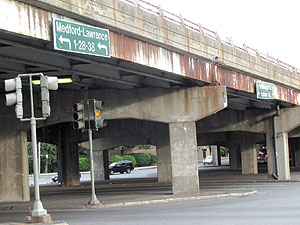
Many residents would rather see the McGrath Highway overpass demolished than repaired. – Photo by Elizabeth Sheeran
Residents question state’s plans for McGrath
By Elizabeth Sheeran
It’s an unsightly concrete colossus that divides the city between East and West, and is despised by the locals. For Somerville residents, the Route 28 McCarthy Overpass might as well be the Berlin Wall. And it can’t come down soon enough.
“Take the overpass down. Take it down yesterday,” said Mayor Joseph Curtatone to thunderous applause from the standing-room-only crowd that packed the Argenziano School cafeteria last week to hear the state’s plans for the McGrath Highway stretch of Route 28.
The state-owned elevated highway carries tens of thousands of Boston-bound vehicles through Somerville every weekday. But the Mayor said it does nothing for the city but hurt the quality of life, cut off neighborhoods and stifle local economic development. “We will no longer be the on- and off-ramp to Boston,” said the Mayor.
The Mayor’s “tear down this overpass” message was echoed throughout the evening by a succession of elected officials, community advocates and residents alike.
Union Square homeowner Julia Prange reflected the general consensus in the room. “I walk, I bike, I take transit and I drive, and I have done all of those things in, around, on, over, under McGrath Highway. And no matter which way I’m getting around, it always sucks,” said Prange. “I just don’t think that overpass works for anyone, not even drivers. Usually it’s cars against people, but that’s not the case here. So let’s put it out of its misery and take it down.”
State Highway Administrator Frank DePaola said the state agrees the overpass should come down, and the Department of Transportation (MassDOT) launched the so-called Grounding McGrath project last year to that end. “We are as committed as the community is to removing the McCarthy overpass, and redesigning and reconstructing this corridor, so that it is part again of your community,” said DePaola.
But he also addressed the real reason nearly 200 people showed up to the meeting: news that the state is about to kick off a two-year, $11 million project to repair the existing structure. “We want to make sure that this overpass remains safe and serviceable for the near future, as we develop the plans for the ultimate disposition and removal of the structure and reconstruction of this corridor,” said DePaola.
MassDOT consultants showed a series of slides that confirmed what everybody in the room already knew: the bridge is in terrible shape. With crumbling concrete and rusted supports, it’s a potential safety hazard for anyone traveling on or under it. They said the repairs are needed to keep it in working order for the 10 to 15 years it will take to complete the Grounding McGrath project, and replace the overpass with a ground-level thoroughfare.
Tom Grondine of SPS New England, which has been awarded the contract for the overpass repairs but not yet given the notice to proceed, said work is slated to begin this summer and end in 2014, with jackhammers used to demolish damaged sections of concrete. Lane shifting and weeknight detours will redirect traffic during the repair work, which along with concrete replacement involves fixing joints and shoring up steel beams.
Many attendees said the repairs are a waste of time and money for a structure that everyone agrees is destined for demolition. They said patchwork repairs won’t guarantee that a 60-year-old bridge will never collapse, and won’t do anything to resolve ongoing safety issues for pedestrians and cyclists trying to navigate around it. And they want the overpass to come down as soon as possible, even if there’s no final plan yet for the area.
“The only way to keep people from getting hurt is to take it down, pave it over, and we can make it pretty later,” said Michelle Hewitt, who lives nearby.
MassDOT officials said the overpass can’t be taken out of service without major traffic disruption, which needs to be studied and planned for. They presented a timeline for the Grounding McGrath project, which includes up to a decade or more of planning, design work and state and federal approval processes, including environmental studies, before any construction can even begin. And that’s assuming the funds are available.
For most people at the meeting, that’s far too long. MassDOT’s 10 to 15-year project timeframe was met with “boos” from the audience. “I’ll be dead by then,” shouted one woman.
Many questioned why Grounding McGrath should take so long, when there is so much consensus in the community as to what to do about the overpass. Ellin Reisner of the advocacy group STEP suggested the project timeline could be shortened under the federal Accelerated Bridge Program (which is funding the shorter-term repairs) by cutting out some of the environmental impact steps.
But DePaola said there was little the state could do to shorten the process. “There are regulations we have to go through,” he said. “It is a process that we have to follow.”
Still, community members left the meeting no less determined to get rid of the overpass sooner rather than later.
“I’m going to be advocating for a much faster timeline, because we’ve been waiting far too long. Our city has been divided far too long,” said Ward Two Alderman Maryann Heuston. “We know that in order to unlock the economic potential of Ward One, Ward Two and the whole Eastern half of the city, this is the lynchpin. This overpass is an enormous obstacle.”















Reader Comments